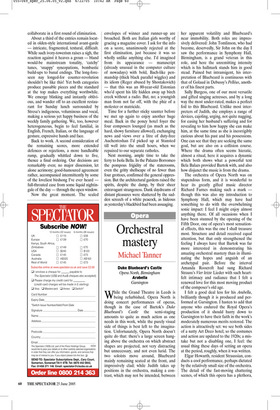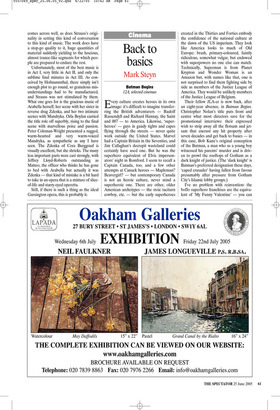Orchestral mastery
Michael Tanner
Duke Bluebeard’s Castle Opera North, Birmingham Arabella Garsington While the Grand Theatre in Leeds is being refurbished, Opera North is doing concert performances of operas, though in the case of Bartok’s Duke Bluebeard’s Castle the semi-staging amounts to quite as much action as one needs in this work, while the purely visual side of things is best left to the imagination. Unfortunately, Opera North doesn’t quite do that: there’s a large screen hanging above the orchestra on which abstract shapes are projected, not very distracting but unnecessary, and not even lurid. The two soloists move around, Bluebeard mainly remaining seated at the front, and impressively clad; while Judith takes up positions in the orchestra, making a contrast, which may not be intended, between her apparent volatility and Bluebeard’s near immobility. Both roles are impressively delivered: John Tomlinson, who had become, deservedly, Sir John on the day I saw the performance in Symphony Hall, Birmingham, is a grand veteran in this role, and here the unremitting intensity which is his hallmark stands him in good stead. Pained but intransigent, his interpretation of Bluebeard is continuous with that of Golaud in Debussy’s Pelléas, another of his finest parts.
Sally Burgess, one of our most versatile and gifted singing actresses, and by a long way the most under-rated, makes a perfect foil to this Bluebeard. Unlike most interpreters of Judith, she employs a range of devices, cajoling, urging, not quite nagging, for easing her husband’s suffering and for revealing to him how happy she can make him, at the same time as she is incorrigibly curious about his past and his possessions. One can see that they are seeking the same goal, but are also on a collision course. Where the drama often seems hieratic, almost a ritual, here it acquires a dynamic which both shows what a powerful text Bela Balazs provided Bartok with, and also how disjunct the music is from the drama.
The orchestra of Opera North was on stupendous form, and it is wonderful to hear its greatly gifted music director Richard Farnes making such a mark though this was also my introduction to Symphony Hall, which may have had something to do with the overwhelming sonic impact: I feel I might enjoy almost anything there. Of all occasions when I have been stunned by the opening of the Fifth Door, one of opera’s most sensational effects, this was the one I shall treasure most. Structure and detail received equal attention, but that only strengthened the feeling I always have that Bartok was far more interested in demonstrating his amazing orchestral mastery than in illuminating the hopes and anguish of an archetypal pair. Before the interval Amanda Roocroft had sung Richard Strauss’s Vier letzte Lieder with such heartfelt intimacy and radiance that I felt a renewed love for this most moving product of the composer’s old age.
I felt a good deal less for his Arabella, brilliantly though it is produced and performed at Garsington. I hasten to add that anyone who endured the Royal Opera’s production of it should hurry down to Garsington to have their faith in the work’s moderately numerous merits restored. The action is attractively set: we see both sides of a natty Art Deco hotel, so the costumes and action are updated to the 1920s; a mistake but not a disabling one, I feel: the usual thing these days of setting an opera at the period, roughly, when it was written.
Elgar Howarth, resident Straussian, conducts a cool performance, perhaps dictated by the relatively small size of the orchestra. The detail of the fast-moving chattering scenes, of which this opera has a plethora, comes across well, as does Strauss’s originality in setting this kind of conversation to this kind of music. The work does have a stop-go quality to it, huge quantities of material suddenly yielding to the luscious, almost trance-like segments for which people are prepared to endure the rest.
Unfortunately, most of the best music is in Act I, very little in Act II, and only the sublime final minutes in Act III. As conceived by Hofmannsthal, there simply isn’t enough plot to go round, so gratuitous misunderstandings had to be manufactured, and Strauss was not stimulated by them. What one goes for is the gracious music of Arabella herself, her scene with her sister in reverse drag Zdenka, and her two intimate scenes with Mandryka. Orla Boylan carried the title role off superbly, rising to the final scene with marvellous poise and passion. Peter Coleman-Wright presented a rugged, warm-hearted and very warm-voiced Mandryka, as sympathetic as any I have seen. The Zdenka of Cora Burggraaf is visually excellent, but she shrieks. The many less important parts were cast strongly, with Jeffrey Lloyd-Roberts outstanding as Matteo, the officer who thinks he has gone to bed with Arabella but actually it was Zdenka — that kind of mistake is a bit hard to take in an opera that is a mixture of sliceof-life and starry-eyed operetta.
Still, if there is such a thing as the ideal Garsington opera, this is probably it.



































































 Previous page
Previous page